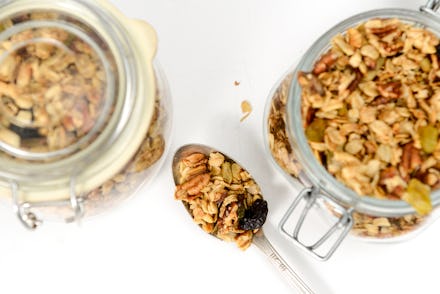7 Healthy Foods That Aren't Actually Good for You — and What You Should Be Eating Instead

When it comes to eating healthy, the sheer plethora of options, advertisements and news articles can make walking down your grocery aisle seem like a walk down Times Square. Many companies have found the lucrative edge of pushing "healthier" but rather just well-marketed food products. From the word "reduced fat" to "superfood," we are in the midst of a health food craze.
For those trying to live a healthier lifestyle, a good diet means more energy, reduced chronic disease risk and longevity. Choosing the wrong food can end up being detrimental, counteracting any other efforts. Often they're high in sugar or empty in most nutrients.
Below are foods we've been programmed to believe are healthy, but actually aren't all that good for you:
1. Granola
One of the most picturesque health food scenes is arguably a bag of granola sitting on a rock overlooking the untouched valley below. Unfortunately, the reality of eating granola on a regular basis is a little less serene. With added sugar, oils and dried fruits, a small serving of granola can be calorie-heavy — and people rarely eat just a tiny bit of granola, according to Prevention. Instead, try making overnight oats.
2. Flavored yogurt
Flavored yogurt or the cups with fruit on the bottom are often loaded with sugar and become more of a dessert than a healthy snack or breakfast, according to CBS. Instead, opt for plain protein-packed Greek yogurt and add fresh fruit.
3. Reduced-fat peanut butter
Peanut butter is naturally high in calories, and its unsaturated fat helps protect our heart and fight inflammation, according to Time. But some companies have rolled out reduced-fat versions — which are just slightly lower in calories but have added sweeteners and less health benefits. Eat regular nut butter in moderation.
4. Dried fruit
Raisins are a popular option for snacks in trail mix or just by the convenient handful. "Fresh fruit is made mostly of water. Drying it out reduces the water volume and increases the amount of sugar per serving," dietitian Tanya Zuckerbrot told Prevention. The added sugar can make blood sugar levels crash, negatively affecting our energy levels. Just eat fresh juicy grapes instead.
5. Nutrition bars
There's a wide variety of nutrition bars out there, labeled for fiber, energy and protein — and many are comparable to a candy bar, according to Men's Fitness. There's also little regulation over nutrition bars; in 2001, a study found that 60% of nutrition bars didn't meet their label claims on things like calories, fat, protein and sugar, according to ABC News. Many bars are high in sugar and calories, made for athletes doing serious workouts. Not being extra cautious while consuming them can leave you with too many vitamins, which can harm your body.
6. Pita chips
Pita chips are the crunchy friend to hummus that's baked not fried. Still, they're often made with the refined grain of enriched wheat flour, which has almost no fiber and is lacking in nutrients compared to whole grain flour, according to Prevention. Try making your own pita chips or sub them out for baby carrots.
7. Rice cakes
Another empty and crunchy snack is rice cakes. While low in fat and calories, they're also low in nutrition, Prevention reported. However, they can have added sweeteners, which can mess with your blood sugar levels. Try crunchy vegetables like carrots or celery instead.